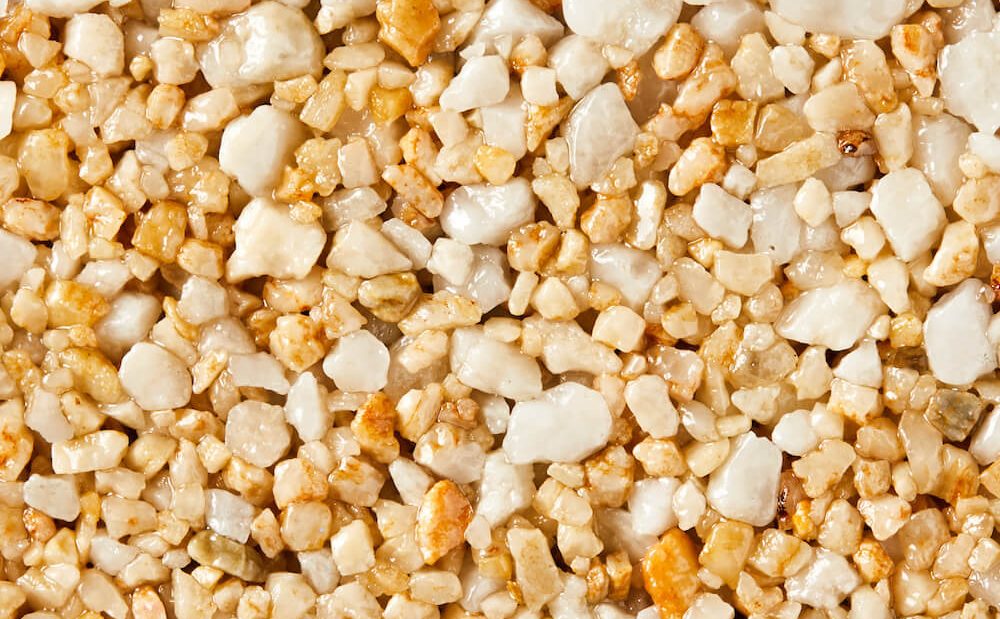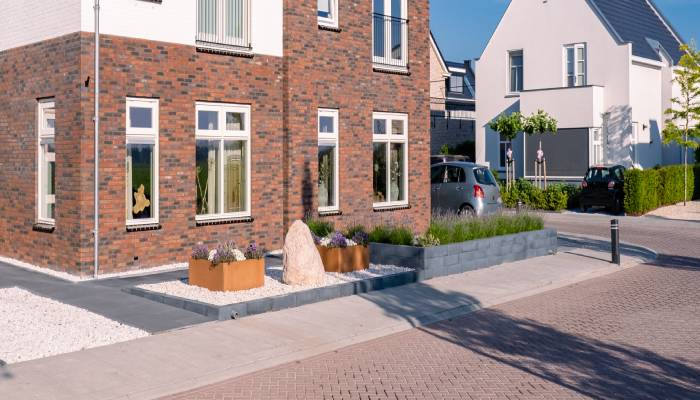A resin bound gravel is a surfacing type created by a mixture of resin and resin bound aggregate stones, resulting in a durable, smooth, flat and permeable surface. In simple terms, stones are bound to the resin as both are mixed together in a forced action mixer to form a smooth mixture.
The implication of this smooth mix is that there are no loose stones unlike in a resin bonded gravel system. Also, resin bound gravel surfaces are porous, thus permeable and SUDS compliant. This means that they allow water to drain through minimising the risk of flash flooding and environmental pollution.

The installation process of resin gravel driveway is simple and straightforward, but must be executed with utmost precision and accuracy to avoid potential issues in the future. These problems may include an uneven surface, cracks, or swelling, all of which can occur due to a poorly installed driveway.
You can either have a trusted gravel resin driveway company do the installation or you can take it on by yourself as a DIY project using professional DIY kits.

We recommend the following kit sizes which are;
This kit contains;
75kg (3 bags) 2-5mm aggregates
25kg (1 bag) 1-3mm aggregates
6.25kg (¹/₄ bag) of C52 sand
Total 106.25kgs - % resin 7.05%
Approximately, this kit can cover an area of 3.55m² at 18mm and 4.0m² at 15mm.
The contents of this kit are;
75kg (3 bags) 2-5mm aggregates
12.5kg (¹/₂ bag) 1-3mm aggregates
6.25kg (¹/₄ bag) of C52 sand
Total 93.75kgs - % resin 6.9%
Approximately, this kit can cover an area of 3.13m² at 18mm and 3.6m² at 15mm.
Pro tip: We highly recommend the use of UV stable resin kits because they are much more durable, resistant to discolouration, fading and cracking. They also offer greater protection during rainfall.
The key to a long lasting driveway lies in the adequacy of its installation. Each step in the process is crucial, to ensure a visually appealing and durable outcome. Below are fundamental steps to take for a successful driveway installation.

When preparing the base for installing a resin bound paving, pathway, patios or driveway, adequate care must be taken, to ensure the integrity and durability of your drive. A poorly done base will most certainly lead to a failed installation and within a short while, your driveway will need repairs.
First, you should check if the existing surface is good enough to carry the new driveway. If it is not suitable enough, then it has to be excavated. A minimum excavation depth of 220mm is recommended for driveways.
The next step will be to install a suitable perimeter edging for your driveway. After this, a hardcore base will be installed at a minimum depth of 150mm. For a fully permeable driveway, we recommend a MOT type 3 subbase.
Thereafter, lay the geotextile membrane and sand bedding layer. This should be followed by a solid base of either tarmac, concrete or X-Grid. Unlike concrete and tarmac, X-Grid doesn’t need curing and so there is no time lag between laying the reinforcement layer and floating the resin.
When laying your subbase, it is important that it is laid at the right depth. This depth is dependent on the type of base being laid. You can follow the below suggestion from our experts:
Tarmac – above 50mm depth
Concrete - above 80mm depth
For the X-Grid-fill the grid with chippings of maximum 20mm diameter.
The formula for calculating the amount of gravel (kg) needed is- Installation area x 72

If you are laying your driveway on an existing surface such as concrete, it is important that you prime the surface. Applying a primer on the surface helps to ensure the surface is dry and free from any contaminants. A wet surface will introduce moisture into the resin which would cause white patches after the resin has cured. Priming also helps to ensure that the concrete surface and the resin mix bonds properly.
When applying the primer, use a roller to spread it evenly. The primer must also be allowed to dry before anything is laid upon it.
For your resin, mix the two components A and B slowly, using a motorised paddle mixer. In your bucket, add the first component and stir for about 10-20 seconds before adding the second component. Mix both parts thoroughly for about 30 seconds to 1 minute until a creamy consistency is achieved.
For the aggregate stones, while the resin components are being mixed, you can add the aggregate to a forced action mixer and dry-mix for 30-60 seconds. This helps to remove any excess dust.
You can either mix in the following ratio-
75% 2-5mm Gravel + 25% 1-3mm Gravel OR
50% 2-5mm Gravel + 50% 1-3mm Gravel
Pro tip: 5% coarse sand or crushed glass may also be added to increase anti-slip property of the resin driveway.

Need a professional to install resin bound gravel? Get in touch today!
The forced action mixer is the best equipment for this job. It is not advisable to use a cement mixer when mixing materials for a resin bound gravel driveway. This is because you will have an inconsistent mix which will be difficult to trowel and as such, resulting in a non-uniform driveway finish.
While the aggregate stones are in the mixer, slowly pour the mixed resin into the mix. Your mixing time should not be more than 4 minutes. Ensure you use a stopwatch to monitor your mixing time and maintain the same mixing time for other batches of aggregate stones and resin. This is to ensure that there is no colour variation. Mix thoroughly ensuring that no material is left uncoated.
When you are done mixing, empty your mix into a plastic lined wheelbarrow and turn off the mixer. You should ensure that you have all the mix scraped off from the mixer and clean it thoroughly after every mix so as to prevent contamination.
When you transfer the mix to the work area, do so by pouring the mix in little quantities that you can manipulate with relative ease. Do not pour too much mix at a time as it increases the time spent on working on the mix and you may not be able to manipulate effectively. Ensure that the mix is evenly spread.
Trowel the mix onto the driveway surface and allow the setup to cure undisturbed for about 6 hours before walking on it. We advise that you allow 24 hours after laying your drive before you use a car on it.
When trowelling, plan your laying route and also use chalk to grid out the area squares. You can also lay batons to show where you want to tip your mix. Use white spirit to clean your trowel prior to starting the laying process. Also clean the trowel regularly (preferably after every six strokes. This is to prevent the trowel from being too sticky and drag aggregates out of position.
Pack the aggregates closely, leaving no gaps and ensure you form a closely compacted level, smooth surface. When pouring in batches, ensure that the last trowelled section is rough so that the next batch can bond with it.
Installing a resin bound gravel driveway offers several benefits that make it a popular choice for homeowners and property developers. Here are some of the advantages:
They are permeable thanks to their porous surface. This also means that they are SUDS compliant. With a resin bound gravel driveway, you do not have to worry about water puddles on your driveway or flash flooding after a heavy downpour.
Bound resin driveways are also very durable and hardwearing. They can last over two decades when well maintained.
They have a low maintenance requirement. They do not need constant surface resealing as with a concrete driveway. They are also resistant to weed growth and you need only a stiff brush to get rid of debris on the surface.
Installation is very quick and easy. An averaged sized driveway can be finished in a day and is ready to be walked upon six hours later.
As long as UV stable resin is used, your driveway will remain in good condition without discolouring for many years.
Resin bound gravel driveways have a smooth surface but are slip resistant, crack and frost resistant.
With a resin bound driveway, you have unlimited design options. Resin bound driveways are eye-catching and elegant.
They are a form of investment for one who wants to sell as they can increase the value of a property by 10-20%
Here are some of our exquisite kiln dried resin bound gravel colours which can either be used as standalone for any driveway project or can be expertly blended to create an even more unique driveway.
Oyster Pearl (UV)

Olympus

Cappuccino

Grey Slate (UV)

Ireland Green (UV)

Jet Black (UV)

Starlight (UV)

Sahara (UV)

Meadow (UV)

Farmhouse Gold

Roman Bronze (UV)

Anthracite

Purity (UV)

Dorset Cove

Amalfi

Sunlight

Briefly, here is how you can care for your resin driveway so that your drive can last a very long time for you;
Regular sweeping using a stiff-bristled broom or brush to remove debris and fallen leaves.
Carry out jet wash twice a year to prevent build-up of stains and dirt which could eventually cause discolouration and loss of beauty.
Hosing down using a garden hose to keep your drive clean
If there is any weed that comes up, you can use a mild weed killer. It should not be harsh as it can damage the driveway surface
For brake fluids and engine oil, make used of warm water
White spirit can also be used to get rid of tyre marks
When there is ice or frost, use rock salt to melt the ice. You can also use a plastic shovel to remove snow.
The cost per m2 of installing a resin bound gravel driveway is between £40 to £70.
See the Table Below for Possible Costs of Installing Different Sizes of a Resin Bound gravel Driveway
| Area (M2) | Cost per M2 | Total Cost |
| 20 | £60 | £1,200 |
| 40 | £60 | £2,400 |
| 100 | £50 | £5,000 |
| 200 | £50 | £10,000 |
The following factors will determine the Cost of your Resin Bound Gravel Driveway Surface-
Condition of Existing Driveway Gravel
Your location
Excavation and other groundwork preparation
Choice of Resin Bound Aggregate
Type of resin used UV resistant or Non-UV resistant
Complexity of design
Depth of The Resin Bound Driveway
Size of The Driveway Area
Edging requirement
Logistics and transport
With over three decades of experience, you can trust us at YourResinDriveway to deliver top quality resin bound gravel driveway. Our team comprises highly skilled technicians who excel in applying industry-leading standards and cutting-edge technology for every project.
We have satisfied thousands of happy customers and we understand that satisfaction is in quality and durability as much as the experience we give to our clients. Some clients just want to elevate their property’s worth, other homeowners just want to fall in love with their home over again.
Whatever the case, you can rest assured that you will receive excellent service with the best competitive rates and a 10-year guarantee.








Our services span across the entire UK, from London to Liverpool, Sheffield, Manchester, Glasgow, Southampton and beyond. No matter where you are, we are able to deliver top-notch services and exceptional results for home improvement projects.
Reach out to us today on our call line 01544 303 021 for further enquiries. If you also wish to request a quote, feel free to do that on a no obligation basis. Give your outdoor space that stunning transformation today.
Related blogs
Click here to unveil the complete guide: Step to Install Resin Bound Gravel
Get ready to transform your driveway into a smooth, attractive, & surface that enhances your curb appeal. Don't miss out – dive into our blog post now to learn the secrets of successful tips for fixing gravel driveway.
The resin bound gravel installation process involves five steps which are- Base preparation, mixing of resin and aggregates separately, mixing resin and other components in a forced action mixer, transferring mix to the work area and trowelling the mix on the driveway.
Thereafter, the set up is allowed to cure for at least 6 hours before being walked upon.
The cost of installing a gravel resin driveway is not fixed but falls between £40 to £70 per m2. There are a number of factors that determine what your resin drive will cost you. Some of these factors include; condition of existing driveway gravel and if there is need for site excavation, location and size of driveway, how complex the design is, depth of driveway and UV stable or non-UV stable resin.
Other factors include choice of resin bound aggregate, edging requirement, weather during the time of installation, logistics and transport. You can always reach out to us to request a free quote for your next project.
Actually, the weather during the time a driveway is being installed will affect its curing time. During the hot summer months, resin will set faster than during the cold winter months. Usually, it will take about 6 hours for your driveway to cure completely and be ready to be walked upon while cars can be driven upon after 24 hours.
If you install your drive during the cold winter period, you may have to let your driveway remain undisturbed for 48 hours or more before driving a car on it.
Resin bound aggregates or decorative gravel stones should be added to a forced action mixer and mixed dry for 30-60 seconds. This helps to achieve a consistent mix of all components. You can then slowly add the bucket of mixed resin to the forced action mixer pan and mix thoroughly with the aggregates.
A resin bound gravel can be laid on Concrete, Tarmac or an X-Grid. These are suitable surfaces to lay a resin driveway upon. Laying a driveway on a poor base will lead to driveway failure. Cracks will appear overtime as well as swelling or caving in. Ensure you seek the advice of an expert to be sure the existing drive in your property is good enough to carry a new driveway.